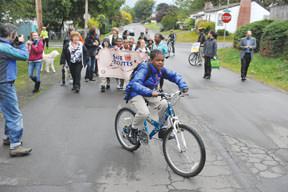 |
||||||||
| MEMO BLOG | Memo Calendar | Memo Pad | Business Memos | Loaves & Fishes | Letters | Home | ||
TIM CURRAN
THE MID-COUNTY MEMO
 |
| Prescott Elementary students, led by 10-year-old Tyra Edwards, were part of International Walk (and Bike) to School Day in the USA last month. Students, parents and staff met at Northeast 107th and Wygant Street to form one of five Bike Trains bound for the school. Mid-county Memo photo/Tim Curran |
In 1970, about half the students in America either walked or bicycled to school. Today, because of different factors -the historic high number of two-income households; parents with less time on their hands to walk their kids to school; exaggeration of “stranger danger” - half of all American schoolchildren get to school in a private vehicle; another 25 percent arrive on a school bus; and fewer than 15 percent walk or bicycle to school.
“We've lost that sense of exploration that you probably had when you were walking or biking to school, talking with friends. That little sense of freedom you didn't need your parents to be with you all the time,” said Bicycle Transportation Alliance Executive Director Rob Sadowsky, who, as part of the event, led one Bike Train to the school. Sadowsky said because of “stranger danger” and other fears, parents do not want their kids getting to and from school on their own.
“I believe parents overprotect their children,” he said. “When we were kids, your parents didn't want to see you until dinnertime. If you got home before dinnertime, something was wrong. Now, you're expected to be on the couch watching television or playing video games.”
Walking with 10-year-old son Kaden, Merissa Perry, who lives about six blocks from the school said, “When the weather isn't too bad, I'll let him walk. Sometimes I'll even walk with him.”
Looking to address these issues, Congress passed legislation establishing the Safe Routes to School Program in 2005. Funded by the U.S. Department of Transportation's Federal Highway Administration, Safe Routes is a combination of pedestrian and traffic education; engineering safer routes; enforcement of school traffic zone speed limits; and events, like last month's, that encourage and promote walking and biking to school.
According to Sadowsky, and excluding New York City, Portland has a higher percentage of kids getting to school on their own than any other large American city: 30 percent are walking and eight percent are riding bikes to school. Sadowsky said that nationally, 12 percent of elementary and high school age children are walking to school today, with another two percent getting there by bicycle. The decline has led to increased traffic congestion, poorer air quality around schools and the related traffic and pedestrian safety issues.
Prescott, in the Parkrose School District, was one of the first schools to adopt Portland Bureau of Transportation's Safe Routes to School Program, now in its seventh year. Since the program's inception, Portland students in general, and Prescott's in particular, are seeing steady increases in the number of kids walking or biking to school.
District Superintendent Karen Fischer Gray is enthusiastic about the program. “We are thrilled with the successful partnership we have with PBOT's Safe Routes to Schools,” she said. “We have projects at all four elementary schools. Students at schools like Prescott need safe streets and sidewalks to support active transportation. While many families support walking or biking to schools, we still have to overcome concerns about the lack of sidewalks in the neighborhood and high traffic areas on Prescott Street and 102nd Avenue. With Safe Routes to Schools we are making changes slowly but surely throughout our district to make sure all of our students can walk or bike to school safely.”
After everyone arrived safely at Prescott, PBOT director Tom Miller; Oregon State Sen. Jackie Dingfelder, D-Portland; and Multnomah County commissioners Loretta Smith and Judy Shiprack joined Prescott Elementary School Principal Michael Lopes and Fischer Gray, who walked with a bike train, at a school assembly lauding the efforts.
 |
 |
 |
 |
MEMO Advertising | MEMO Archives | MEMO Web Neighbors | MEMO Staff | Home
